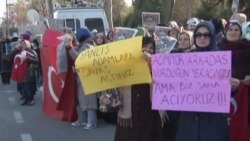The Turkish government has been defiant in the face of criticism at home and abroad for its raids targeting opposition media. The European Union on Monday expressed dismay after President Recep Tayyip Erdogan lashed out at Brussels for criticizing his government's action. Turkey's bid to be considered for EU membership has been on hold while critics accuse the NATO ally of increasingly authoritarian rule.
Protesters denounce raids
Protesters gathered outside Istanbul's police headquarters Monday with signs condemning police raids on the Zaman newspaper and Samanyolu TV station, and the arrest of their senior journalists and editorial staff. The European Union condemned the raids as "incompatible with the freedom of media."
President Erdogan lashed out at the EU critics. In a televised speech from a western city, he said the 28-nation group should "mind its own business." "When we take these kinds of decisions, what the EU thinks about it, whether it accepts it or not, doesn't matter to us at all," he said. "We don't care."
EU foreign policy chief Federica Mogherini said she was surprised at Erdogan's reaction. Turkey is a NATO member, aspiring to become a candidate for EU membership. "I've seen the reactions from President Erdogan and I'm very surprised, because in the visit we had last week, we discussed in a very constructive way," she recalled.
German Foreign Minister Frank-Walter Steinmeier said Turkey's actions are "more than just worrying."
Journalist detained
More than 20 journalists remain in detention after the crackdown on Sunday, which comes almost a year after the opposition media accused the government of corruption. Turkey denies any political prosecution and claims the arrests were made in connection with a plot to overthrow the government.
"This is a legal process. This process is not influenced by politics. This process has not started by an order from the government or any member of the Cabinet," said Turkish Deputy Prime Minister Bulent Arinc.
Press freedom
Last year, Turkey was criticized for using excessive force to disperse massive anti-government protests. Recent months have seen raids against suspected opponents in the police force. This is the first major operation against opposition media outlets.
"These were the only anti-government media outlets. Maybe millions were expressing themselves through these media outlets. The autocratic regime controlled by one person is now trying to prevent this, too, but people have no intention of letting him," Mustafa Yesil, chairman of the Journalist and Writers Foundation.
Some analysts say Turkey has long had a poor record on media freedoms.
"Turkey occupies 154th place out of 180 worldwide in terms of freedom of the press, according to Reporters Without Borders," said Erol Onderoglu with Reporters Without borders, Turkey. "It's a worrying situation which has been going on for almost 10 years."
The United States has urged Turkey to keep from violating core democratic values enshrined in its own constitution.





